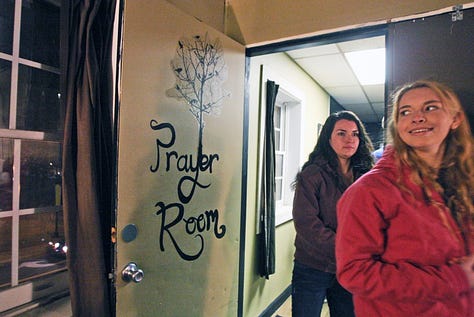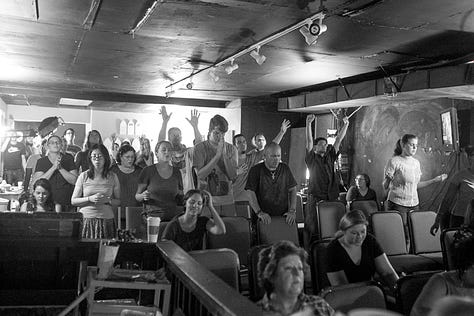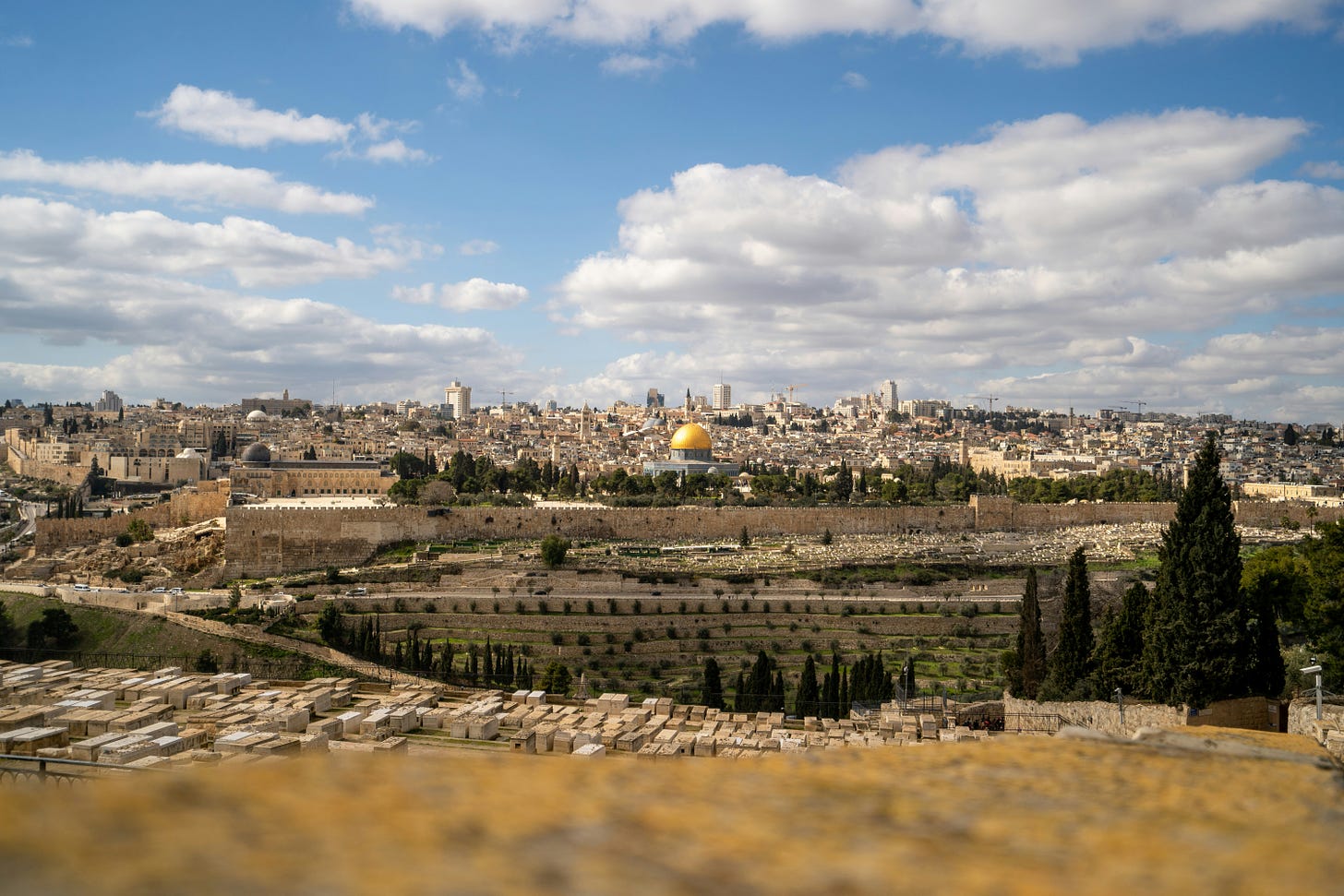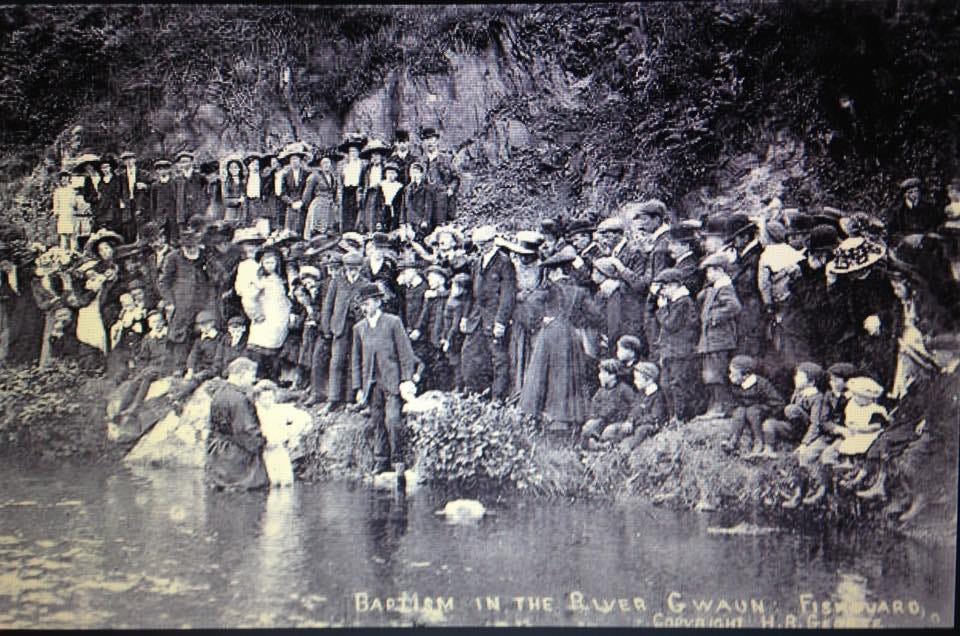After several years of hosting worship and prayer gatherings in the early 2000s, our local community in Greenville, NC began to be gripped by this idea of a place of ongoing worship and prayer. We hosted Friday night worship nights for years, but other expressions of prayer and worship were also emerging in our city.
By 2007, we began hosting twenty-four-hour worship weekends almost every month. In 2008, a local church had hosted ten months of 24-7 prayer in their sanctuary. Around the same time, campus ministries at East Carolina University started hosting weeks of 24-7 prayer, as well as late-night worship and prayer gatherings during the week.
Many of us were longing for a place to host God’s presence in an ongoing way in our region, much like David longed for a place for God’s presence. Up to that point, local churches had always let us utilize their facilities, but what would it look like for our community to have a dedicated place for worship and prayer? A place for God?
During that season, I would go around and visit prayer meetings in our city. A local intercessor named Nancy attended one of these meetings, and she was one of those special “prayer warriors” who seemed to have a direct line to God. When she prayed for stuff, stuff happened! After a prayer meeting in early 2009, Nancy came to me unprovoked and said, “So when are you getting a building for your ministry?”
What she didn’t know was that my wife and I had recently been driving around Greenville looking at buildings, dreaming about a place for a house of worship and prayer — a “tabernacle of David” for our city. You have to understand: We were newlyweds with no money. No resources. No plan. We were just dreaming and praying together!
A Boiler Room
While roaming the city, we had found an abandoned hotel with a conference center that we thought was really cool. We circled the facility, looking for a sign somewhere that would indicate who might own the property. The only sign we found was on a door on the back of the building that read ”Boiler Room.” We were so excited, because we had heard about the 24-7 Prayer movement in the United Kingdom calling their prayer rooms “boiler rooms.” The term “boiler room” was borrowed from Charles Spurgeon, who used to attribute the success of his preaching to his “boiler rooms'' — his rooms of intercessors that he considered the power source of his ministry. We thought the sign on the hotel must be a sign from God. We were sure this meant that God was going to give us that building as a “boiler room” for our city! We could house the homeless, establish 24-7 worship and prayer, host conference events, and more. It would be an amazing ministry center to impact our region.
Within a few weeks, the building had been demolished. Bulldozed to the ground. We were dumbfounded. So, we drove around the city again, looking and dreaming. We saw a smaller space for rent in the heart of downtown Greenville. It was above a skateboard shop on a corner. Across the street was East Carolina University. The opposite direction was the main downtown strip of bars, clubs, and restaurants where ECU students would come to party on the weekends. It was much smaller. The aesthetic was raw and grungy. But the location was amazing. It was a few weeks after all this that Nancy asked me about a building. I told her that we were dreaming together, and she asked if we had a location in mind. I told her about the building downtown above the skate shop. She said she would start praying.
Within a few months, I had shared the whole story with our ministry’s board of directors. We ended up driving downtown to see the space for rent. In the parking lot, one of our board members, a local dentist, randomly started weeping. He said he had just heard the audible voice of God say, “This is a place I want my glory to dwell.” We were stunned.
He then told us God was leading him to rent the building for us. I suggested that we should probably look inside and find out how much it cost first! He was not deterred. Regardless of the details, he said that God had spoken. He was committed to rent that space for us in order to obey God’s voice and establish a place of worship and prayer in downtown Greenville. We ended up calling it the Boiler Room.



Thin Places
It was clear that God was asking us to host His presence in a specific place. Like David prepared a tent on Mt Zion for the ark of the covenant, we were preparing a place for day-and-night worship and prayer in our city. We always knew that the building itself wasn’t really the “place” for God; that has always been His people. The Scriptures say that we are living stones built together as a house for the Lord (I Peter 2:5). We are the spiritual “place” where God dwells on the earth (Ephesians 2:21-22). But apparently, God also wanted a specific geographic area to assemble His living stones.
We had read about what the monks called “thin places” — places where they said that the veil between heaven and earth became thin. Some charismatic folks use the word “portals” to describe these geographic locations where God seems to uniquely manifest His glory. It just seems that in some areas it is easier to be aware of God’s manifest presence. Pete Greig explains:
We are told that, prior to giving the Lord’s Prayer, “Jesus was praying in a certain place.” That’s significant. There seem to have been certain places in which he preferred to pray. Elsewhere, he advised his disciples, “When you pray, go into your room, close the door.” The location clearly mattered. On the day of Pentecost, we are told that the Holy Spirit first “filled the whole house where they were sitting” so that the disciples “saw what seemed to be tongues of fire” and then, moments later, “all of them were filled with the Holy Spirit.” Isn’t that an interesting progression? The Holy Spirit filled the place before he filled the people. (How to Pray, pgs 9-10)
I don’t totally understand this phenomenon, but I think about the story of Elisha’s bones. Even though Elisha was dead, those who touched his bones were resurrected (2 Kings 13:21). It was like a residue of God’s presence was resting on a physical place. My theory is that if there is a place on earth where God is welcomed consistently, it becomes a “thin place” where His manifest presence seems to linger, even after we leave.
Why Jerusalem?
In Psalm 132, we discover that God was inviting David to establish a thin place in Jerusalem, also known as Mt. Zion: “For the Lord has chosen Zion; He has desired it for His dwelling place” (Ps. 132:13). God said that Jerusalem was to be the resting place for the ark of the covenant. Bible teachers have various theories about why David chose Jerusalem to be the new capital of Israel. Many believe it was because the geography of the region was beneficial to providing water, or that the hills protected them from invaders. But I wonder if there is a more spiritual reason?
The first time we see Jerusalem mentioned in Scripture is in a strange story with Abraham and a character named Melchizedek. It says in Genesis 14:18:
Then Melchizedek king of Salem brought out bread and wine; he was the priest of God Most High.
The Salem where Melchizedek was king would become known as Jerusalem. This king Melchizedek was also a priest of Yahweh on Mt Zion, and he brought out bread and wine to give to Abraham after a battle. Over 500 years before David became king, God was already being worshiped and ministered to by a priest (who was a king) in this same place. We will learn more about Melchizedek later, but it makes me wonder if God’s desire to dwell on Mt Zion had something to do with this priest-king. I wonder if Zion was already a thin place before David got there? Either way, Jerusalem was God’s place. It was there that David would establish his tabernacle — the “boiler room” of Israel. Like our little prayer room in Greenville, David’s tabernacle was a simple structure marked by God’s glorious presence and power.
The Manifest Presence of God
It was probably David’s son Solomon who was inspired to write Psalm 132 in remembrance of his father. The song begins with David’s afflictions, but it is primarily about David’s vision for a dwelling place of God’s presence and the vow that he made before God to see that vision come to pass. David’s longing for God grew into a burning desire to establish a resting place for the manifest presence of God on the earth. As king of Israel, David wanted his kingdom to experience that presence. This is what led to the great procession of the ark and gave birth to David’s tabernacle.
I will not give sleep to my eyes or slumber to my eyelids, until I find a place for the Lord, a dwelling place for the Mighty One of Jacob. Psalm 132:4-5
To understand David’s vision for a dwelling place for God, we need to understand the different dimensions of God’s presence described in the Scriptures. There is a genuine, biblical understanding that God is everywhere. This is called God’s omnipresence. David was well aware of this dimension of God’s presence. He knew he could never get away from the watchful eye of the Lord (Psalm 139:7-8). No one can hide from God. AW Tozer says of God’s omnipresence:
“In His infinitude He surrounds the finite creation and contains it. There is no place beyond Him for anything to be.” (Knowledge of the Holy, pg 74).
But this is not what we mean when we typically refer to God’s presence. Even though He is everywhere, we may not recognize or sense Him. When we speak of God’s presence, we typically mean His manifest presence, which is where God makes His omnipresence known to people in a particular place. Jack Hayford describes this as:
“invading circumstances, moving in power, demonstrating His grace, revealing His sovereign might, extending His kingdom mercies and transforming people, churches, communities and whole regions of the earth.” (pg 23 of Rewards of Worship)
What Hayford writes is what David had in mind when he made his vow in Psalm 132. His vision was that God would make Himself known in his life, in his city, and in his nation. Jesus spoke of God’s manifest presence when He promised to be among His followers when two or three gather together in His name (Matthew 18:20). Jesus is already everywhere, but his promise to be “in the midst” of his disciples indicates that we can experience a particular manifestation of His presence. David’s “dwelling place” vision was for God’s manifest presence to fill the nation of Israel, where people would be experiencing a strong sense of God’s glory, nearness, and power. His idea was that God’s glory and presence would rest in a particular geographic place. For David that place was Jerusalem. “For the Lord has chosen Zion; He has desired it for His dwelling place” (Ps. 132:13).
Some might argue that we already have God’s presence with us because Christians have the Holy Spirit inside them. Yes! As Christians, we receive the Holy Spirit at the point of our conversion (Ephesians 1:13-14). We have personal access to God’s presence, power, and Spirit through Christ Jesus. That is incredible, but is not primarily what we are talking about here. David’s vision was not mainly about his personal breakthrough or experience. He was longing for something to impact his city and nation. He was longing for corporate breakthrough and revival. He wanted the entire nation to collectively experience what he had already personally experienced in his relationship with God.
The original Hebrew word David used for a “place” for God in Psalm 132:5 is the word māqôm. It typically refers to land or a locality. It can also be translated as “space” or “region.” What does it look like for God’s glory to rest upon a region? In historic revivals, we have seen glimpses of what can happen when a city or nation comes under the sway of God’s manifest presence. It was said of the Welsh revival in the early 1900s that: “The awe of the Lord was upon everyone and His presence was felt everywhere. Spontaneous prayer meetings began in the mines, factories, schools and shops. Even the amusement parks were filled with a holy awe as brigades of evangelists swept through them. Many who entered taverns to order drinks left them untouched as conviction and the fear of God came upon them.” (Rick Joyner, The World Aflame, pg. 51)
That is what David is dreaming about — a dwelling place for God’s glory in their land.
A Resting Place
In Psalm 132, David seems to use the terms “dwelling place” and “resting place” interchangeably. However, the phrase “resting place” gives us unique insights into David’s vision and God’s desire. What does it mean specifically that God would “rest” in a place? The first place we see God rest in the Scriptures is on the seventh day of creation — the Sabbath. What does it mean that God “rested” on the seventh day?
It did not mean that God was tired. He does not get weary. God’s rest on the sabbath was an indication that the earth had become His resting place. The work was done. It was exactly how He wanted it. There was no tension, no struggle, no fight, no challenge. God had things just as He desired. His will was being done perfectly. Heaven was on earth. (See The Temple and the Church’s Missions by G.K. Beale, pg 60-62, for more on the connection between God’s sabbath rest and his resting place in the tabernacle.)
Since sin has come into the world, there is now “unrest” in the world, where the kingdom of darkness is colliding with the kingdom of God. God’s will is no longer perfectly done on the earth, although God’s desire is to restore His kingdom and perfect will right here, as it is in heaven.
Your kingdom come, your will be done, on earth as it is in heaven. Matthew 6:10
We could say, then, that God’s resting place is a place of God’s kingdom. When God can rest in a place, it means that that is a place where everything is submitted to Him. God’s resting place is a place where He has complete dominion. It is not just a place of His presence and power, it is a place where He reigns over everything. In God’s resting place, an entire group of people and a geographic place come under His divine leadership.
David’s desire was not just for a place where Israel could experience God’s presence and worship Him, but David was inviting God to come and take His rightful place as King over Israel. David’s “resting place” vision was not just for a Temple to be built, but for the very throne room of God to be established in their midst.
Even after David established his tent in Zion, he was still not fully satisfied. He longed to build a permanent place for God’s presence (I Chronicles 17:1). Yet God would not allow David to do it. It would be his son Solomon who would build the Temple in Jerusalem, and Solomon would read a portion of Psalm 132 at the Temple inauguration (2 Chronicles 6:41-42). The permanent Temple provided a measure of fulfillment of David’s vow, but it would be another Son of David who would eventually manifest David’s vision for heaven on earth. David’s “dwelling place” dream was touching something much broader than God’s purposes simply for his generation or his nation. He was connecting to God’s heart for the nations of the earth to become resting places of His presence and kingdom.







